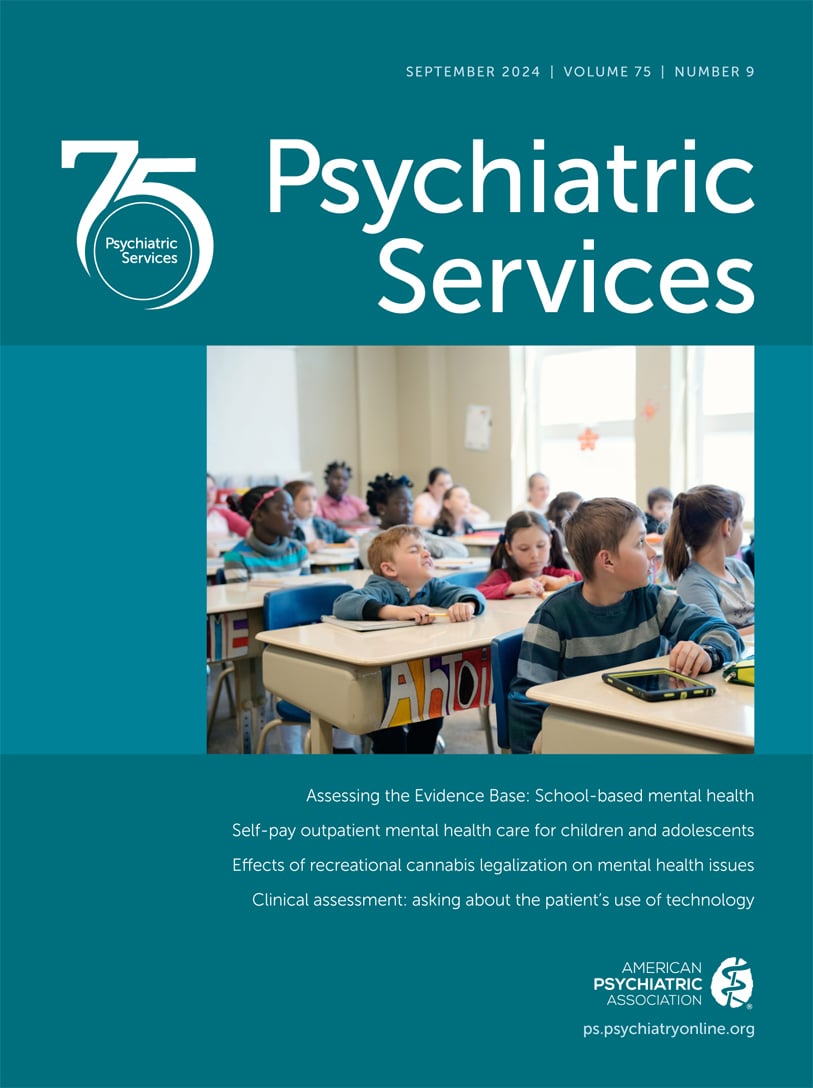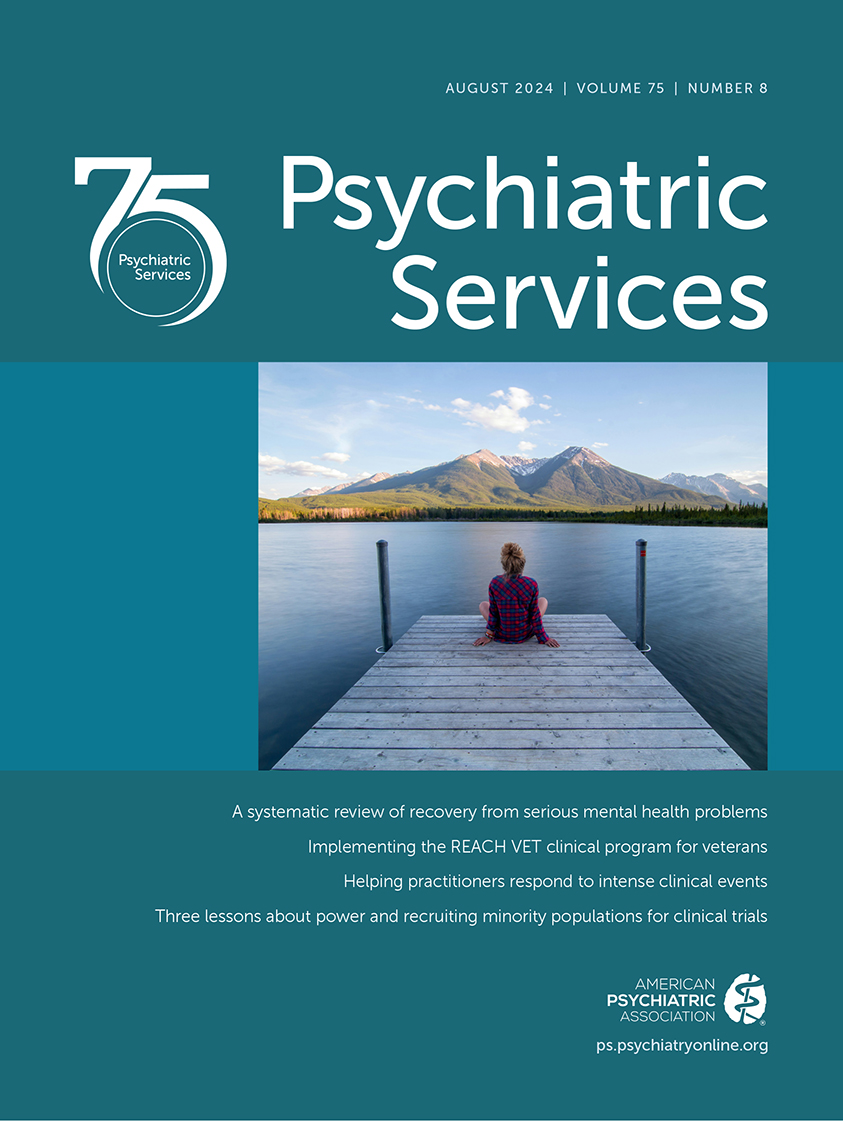Psychiatric Services
- Volume 63
- Number 2
- February 2012
Taking Issue
This Month's Highlights
Columns
Publication date: 01 February 2012
Pages107–109The impact of parity coverage on the quantity of behavioral health services used by enrollees and on the prices of these services was examined in a set of Federal Employees Health Benefit (FEHB) Program plans. After parity implementation, the quantity of ...
https://doi.org/10.1176/appi.ps.20120p107Publication date: 01 February 2012
Pages110–112This column describes an innovative, government-sponsored, countrywide mental health reform focusing on rehabilitation and community integration of persons with serious mental illness, which was enacted into law in Israel in 2000. The reform was part of ...
https://doi.org/10.1176/appi.ps.201100009Articles
Medication Use and Spending Trends Among Children With ADHD in Florida's Medicaid Program, 1996–2005
Publication date: 01 February 2012
Pages115–121How has the introduction of new drugs for ADHD changed the treatment landscape? Analysis of ten years of data for more than 107,000 Medicaid-enrolled children with ADHD found that the proportion treated with drugs increased only slightly, from 60% in 1996 ...
https://doi.org/10.1176/appi.ps.201100095Publication date: 01 February 2012
Pages122–129Objective: This study sought to better understand factors associated with different patterns of treatment among children starting treatment for attention-deficit hyperactivity disorder (ADHD). Methods: Factors associated with service utilization and ...
https://doi.org/10.1176/appi.ps.201000532Publication date: 01 February 2012
Pages130–134Objective: The authors surveyed U.S. juvenile mental health courts (JMHCs). Methods: Forty-one were identified in 15 states, and 34 returned surveys; one was completed on the basis of published information. Topics included the court's history, youths served,...
https://doi.org/10.1176/appi.ps.201100113Publication date: 01 February 2012
Pages135–141Service changes at San Francisco General Hospital cut the number of beds for acute public-sector psychiatric patients by 50%, providing a natural experiment for documenting the effects. Researchers analyzed a range of indicators and found no evidence of ...
https://doi.org/10.1176/appi.ps.201000145Publication date: 01 February 2012
Pages142–146Objective: The aim of this study was to examine whether a more inclusive definition of mental health treatment that incorporates unconventional treatment may partially account for the racial disparity in treatment-seeking behavior. Methods: Using 2005–2007 ...
https://doi.org/10.1176/appi.ps.201100008Publication date: 01 February 2012
Pages147–153Objective: The aim of the study was to assess the impact of systematic use of the DSM-IV-TR cultural formulation on diagnoses of psychotic disorders among patients of ethnic minority and immigrant backgrounds referred to a cultural consultation service (...
https://doi.org/10.1176/appi.ps.201100280Concordance Between Psychotropic Prescribing for Veterans With PTSD and Clinical Practice Guidelines
Publication date: 01 February 2012
Pages154–160Objective: Clinical practice guidelines for the pharmacological treatment of posttraumatic stress disorder (PTSD) do not support the use of benzodiazepines and cite insufficient evidence to recommend mood stabilizers. Although guidelines previously ...
https://doi.org/10.1176/appi.ps.201100199Publication date: 01 February 2012
Pages161–168Objective: Forgetting is commonly stated as a reason for missing mental health appointments. The authors examined the effect of short message service (SMS), or text message, reminders on the attendance of appointments at four community mental health ...
https://doi.org/10.1176/appi.ps.201100211Open Forum
Publication date: 01 February 2012
Pages169–173Authors of the Open Forum make the case that consumer self-determination�personal choice informed by shared decision making and a recovery orientation�has replaced treatment adherence as the care paradigm for people with serious mental illnesses.
https://doi.org/10.1176/appi.ps.201100065Publication date: 01 February 2012
Pages174–175Psychosocial programs that introduce young people with psychosis to each other encourage bonding and, perhaps, marriage. By providing such programs, are we unwittingly promoting assortative mating, with ill effects for offspring? Or, on the other hand, ...
https://doi.org/10.1176/appi.ps.201100164Brief Reports
Publication date: 01 February 2012
Pages176–178Objective: A three-month prospective trial of a psychosocial intervention—customized adherence enhancement (CAE)—was conducted with 43 medication-nonadherent individuals with bipolar disorder. Methods: CAE modules were administered as indicated by a screen ...
https://doi.org/10.1176/appi.ps.201100133Publication date: 01 February 2012
Pages179–181Objective: This study examined use by American Indian and Alaska Native veterans of services provided by specialty telemental health clinics focused on posttraumatic stress disorder. These clinics offer services via videoconferencing to address challenges ...
https://doi.org/10.1176/appi.ps.201100098Publication date: 01 February 2012
Pages182–185Objective: The purpose of this study was to determine if veterans with posttraumatic stress disorder (PTSD) and mild traumatic brain injury (TBI) are treated differently pharmacologically than patients with PTSD alone. Methods: A retrospective evaluation of ...
https://doi.org/10.1176/appi.ps.201000531Suicide Thoughts and Attempts and Psychiatric Treatment Utilization: Informing Prevention Strategies
Publication date: 01 February 2012
Pages186–189Objectives: The aim of this study was to investigate the characteristics of nonreceipt of specialty psychiatric treatment among those who experienced suicidal thoughts or who attempted suicide. Methods: Data were from the 2008–2009 National Survey on Drug ...
https://doi.org/10.1176/appi.ps.201100159Book Reviews
News & Notes
Past Issues
View Issues Archive
Vol. 75 | No. 11

Vol. 75 | No. 10

Vol. 75 | No. 9
